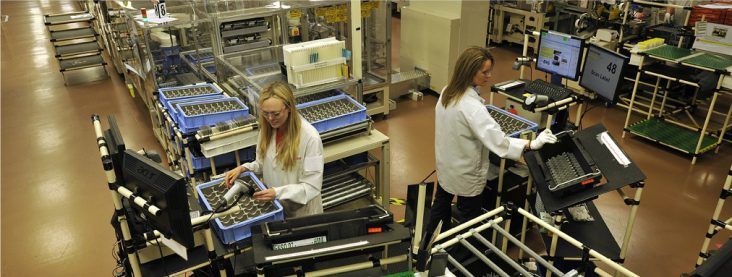Denso undergoing global transformation from auto parts supplier to technology player
by January 31, 2018 6:26 pm 1,178 views

As technology breakthroughs in robotics and artificial intelligence (AI) continue to change the face of industry, Denso Corp. has taken another step towards its goal of transforming from the world’s largest aftermarket supplier to retooling as a major technology developer of products that improve driver safety and innovation.
The Japanese automotive giant, which has major operations in Northeast Arkansas and key partnerships with other Toyota-aligned companies across the Midwest and Southeast U.S., announced Wednesday (Jan. 31) it will open a new office in Tokyo in April 2018 to conduct research and development activities on advanced driver assistance (ADAS), automated driving and connected vehicles.
Wednesday’s announcement continues Denso’s dramatic companywide shift toward sustainability and reducing its environmental footprint by 2030. That overarching goal has led the Japanese automotive components giant to increase its investment in the U.S. in developing auto parts for environmentally-friendly cars and sophisticated vehicle safety and security systems.
At its new global R&D headquarters, Denso said it will also transfer part of the research and development functions currently located in its head office in Aichi Prefecture, Japan and existing Tokyo office to the new facility. It will also expand its workforce there to improve R&D capabilities through the early 2020s.
The new R&D office will not only develop advanced technologies, but also work with the company’s global headquarters to organize and lead the operations of Denso’s regional hubs as the global auto parts giant decentralizes development in 2018 to become more agile and expedite innovation.
“These partnerships align with Denso’s widespread adoption of safety technologies that will play a critical role in the advancement of future mobility,” the company said in a statement.
In addition, the new R&D office will collaborate with universities, research institutes, startups and other partners to develop modern technologies by adopting the characteristics of each region, including the company’s largest market in the U.S.
U.S. OPERATIONS RETOOLING, $1 BILLION INVESTMENT IN TENNESSEE
Over the past few years, Denso has made numerous operational changes at its North American headquarters in Southfield, Mich., to retool 28 consolidated subsidiaries and four affiliates across the U.S., Canada, and Mexico.
For example, Denso announced an expansion in October of its U.S. footprint with a $1 billion investment in its Maryville, Tenn. subsidiary that serves as the company’s primary manufacturing center in North America for electrification and safety systems. That investment will triple the company’s current 500-person workforce there by creating more than 1,000 new production and support jobs, including high-paying positions for technicians and engineers.
“This is an investment in the future of Denso, and also the future of transportation. We are seeing dramatic shifts in the role of transportation in society, and this investment will help position us to meet those changing demands,” said Kenichiro Ito, chairman of Denso’s North America board of directors and CEO of Denso International America.
A few weeks after the Maryville announcement, Denso unveiled the company’s long-term policy objectives that it said will generate revenue of $9.1 billion and operating profit of 10% by 2025 by focusing on electric vehicles, automated and connected driving, and non-automotive businesses such as factory automation and agriculture.
DENSO ARKANSAS OPERATIONS UNAFFECTED TO DATE
To date, company officials have not addressed how these significant changes will affect its U.S. operations that employ more than 17,000 people at manufacturing facilities in Alabama, Arkansas, California, Iowa, Georgia, Kentucky, Michigan, North Carolina, Ohio, Pennsylvania, South Carolina, Tennessee and Texas.
Exactly a year ago, Denso reshuffled its North American executive team in Southfield, Mich., to help broaden the company’s operations and strengthen the regional approach to developing products for key customers.
When it was first built in 2003, Denso’s plant in Osceola was touted for its robotics and state-of-the-art production facility that manufactured HVAC systems, radiators and engine cooling modules for its North American customers such as Toyota, Honda and Caterpillar. Today, that 225,000 square foot facility, led by Denso Manufacturing Arkansas president George Harguess, employs about 500 employees.
In just the past two months, Denso has announced several key developments in the company’s quest to become a major player in the emerging advanced driving industry. On Dec. 13, Denso and Toyota’s Tsusho Corp. announced plans to conduct the world’s first test using a quantum computer to process data from a traffic IoT platform that calculates vehicle location and travel information in real-time.
A day later, Denso and Blackberry Limited companies announced they had jointly developed the world’s first integrated HMI (Human Machine Interface) platform. That technology, which was developed in collaboration with Intel Corp., will allow various content and sound applications to be integrated into one uniform display inside the automobile cockpit.
Denso also announced in December that it had acquired Holland, Mich.-based startup InfiniteKey Inc., to help the automotive giant to develop and patent technologies that will allow drivers to operate their cars through their smartphones. By becoming part of Denso, company officials said InfiniteKey’s “phone-as-a-key” technology can reach “the broadest positive penetration in the automotive market.”
In 2018, Denso has already announced several other smaller deals with other technology startups that will focus on developing AI-power fleet management tools, a semiconductor device for electric cars, and a new vision sensor to improve nighttime driving.
Denso is also expected to have a significant role in the $1.6 billion Toyota-Mazda plant that is expected to employ 4,000 workers by 2021. According to preliminary details of that multi-billion dollar project, that facility will allow the Japanese automakers to jointly develop electric vehicles and connected-car technologies and collaborate on advanced safety features in the U.S.
Although the Arkansas Economic Development Commission submitted a bid last year for the joint venture, the two Japanese auto giants announced earlier this month that the plant would be built in Alabama. Toyota still partly owns about 25% of Denso, which reported annual revenues exceeding $41 billion in 2017.
